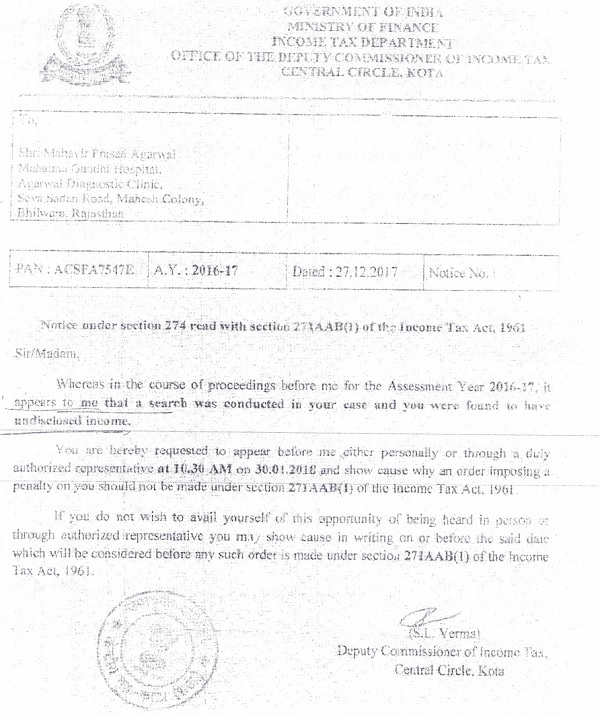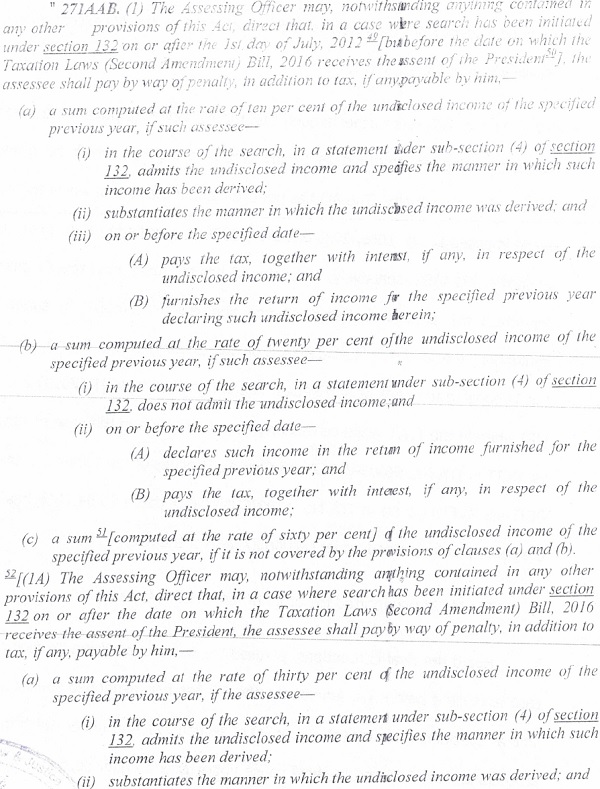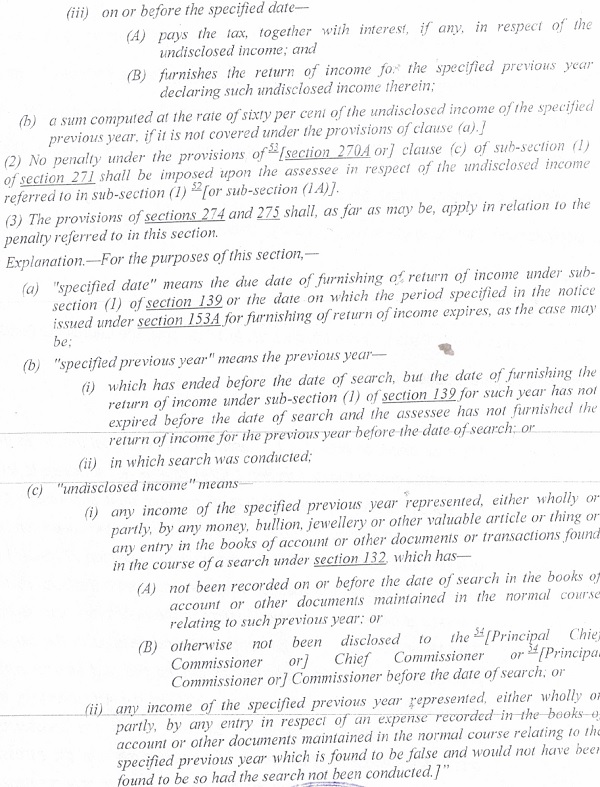Case Law Details
Mahaveer Prasad Agarwal Vs DCIT (ITAT Jaipur)
Introduction: The Mahaveer Prasad Agarwal vs. DCIT case at ITAT Jaipur brings forth essential insights into the discretionary nature of penalties under sections 271AAB and 271 of the Income Tax Act. This article delves into the intricacies of the case, shedding light on the implications for taxpayers.
Detailed Analysis: The case revolves around the discretionary imposition of penalties under sections 271AAB and 271 of the Income Tax Act. A crucial aspect is the absence of specificity in the show cause notice, raising questions about the validity of the penalty proceedings. The Tribunal’s nuanced analysis and reference to precedent cases, including Shri Padam Chand Pungliya vs. ACIT, provide a comprehensive understanding of the legal intricacies.
Conclusion: ITAT Jaipur’s decision in Mahaveer Prasad Agarwal’s case emphasizes the discretionary nature of penalties and the importance of a well-defined show cause notice. The ruling serves as a guiding precedent for taxpayers facing penalty proceedings under sections 271AAB and 271. Understanding the implications outlined in this case can prove instrumental in navigating similar tax scenarios.
A conjoint reading of section 271AAB and section 271 of the Act indicate that imposition of penalty under section 271AAB of the Act is not mandatory but discretionary. Hence, in our view, the penalty under section 271AAB be imposed on merits of each case.
5.1. In case of Shri Padam Chand Pungliya vs. ACIT (supra), the Coordinate Bench has held at para 5 page 7 of its order as under :-
“It is pertinent to note that the disclosure of additional income in the statement recorded under section 132(4) itself is not sufficient to levy the penalty under section 271AAB of the Act until and unless the income so disclosed by the assessee falls in the definition of undisclosed income defined in the explanation to section 271AAB(1) of the Act. Therefore, the question whether the income disclosed by the assessee Is undisclosed income in terms of the definition under section 271AAB of the Act has to be considered and decided in the penalty proceedings. Since the assessee has offered the said income in the return of income filed under section 139(1) of the Act, therefore, the question of taking any decision by the AO in the assessment proceedings about the true nature of surrender made by the assessee does not arise and only when the AO has proposed to levy the penalty then it is a pre-condition for invoking the provisions of section 271AAB that the said income disclosed by the assessee in the statement under section 132(4) is an undisclosed income as per the definition provided under section 271AAB, Therefore, the AO in the proceedings under section 271AAB has to examine all the facts of the case as well as the basis of the surrender and then arrive to the conclusion that the income disclosed by the assessee falls in the definition of undisclosed income as stipulated in the explanation to the said section. Therefore, we do not agree with the contention of the Id. D/R that the levy of penalty under section 271AAB is mandatory simply because the AO has to first issue a show cause notice to the assessee and then has to make a decision for levy of penalty after considering the fact that all the conditions provided under section 271AAB are satisfied.”
It is evident from the show cause notice issued under section 274 read with section 271AAB that the AO was not clear as to on what precise charge the appellant was asked to show cause, whether the assessee shall pay by way of penalty under clause (a), (b) or (c) of section 271AAB. The AO has just mentioned “deliberately concealed the true income”. Thus the AO without mentioning specific default of the assessee in terms of clause (a), (b) or (c) of section 271AAB of the Act, the show cause notice issued in routine manner cannot be considered a valid notice in the eyes of law and accordingly the levy of penalty against the assessee is held to be void ab initio.
FULL TEXT OF THE ORDER OF ITAT JAIPUR
This is an appeal filed by the assessee against the order of learned CIT (Appeals-2), Udaipur dated 22.07.2019 for the assessment year 2016-17. The assessee has raised the following grounds of appeal :-
1. That on the facts and in the circumstances of the case, the Id. CIT (A) erred in upholding the validity of order passed by the Id AO.
2. That on the facts and in the circumstances of the case, the Id. CIT (A) erred in sustaining penalty of Rs. 87,300/- u/s 271AAB of the Act.
3. That on the facts and in the circumstances of the case, the Id. CIT (A) erred in recording various observation in the appellate order are contrary to the provisions of the law, and against the law decided by the Hon’ble Courts.
4. That on the facts and in the circumstances of the case, the Id. CIT(A) erred in not considering the explanation and judicial decisions referred by the appellant.
5. That the petitioner may kindly be permitted to raise any additional or alternative grounds at or before the time of hearing.
6. The petitioner prays for justice & relief.
The assessee has also raised an addition around vide an application received in this office on 28th July, 2020 which reads as under :-
“That the show cause notice issued u/s 274 r/w 271AAB(1) of the Act, is quite vague and did not at all specify the specific clause of S. 271AAB of the Act under which the penalty was initiated i.e. whether it is for clause (a) or clause (b) or clause (c) of section 271AAB(1) because the conditions for imposing the penalty under each such clauses are separate. The impugned penalty based on such a notice being contrary to the provisions of law & facts kindly be quashed.”
2. The brief facts of the case are that the assessee is an Individual and derives income from salary from Arihant Hospital and Research Sansthan, Bhilwara, pension from Government of Rajasthan, income from medical practice, earning interest, dividend income and also agricultural income. A search and seizure operation under section 132(1) of the I.T. Act, 1961 was carried out on 02.07.2015 at the various premises of M/s. Kota Dal Mill Group (Shri Rajendra Agarwal), Kota. The case of the assessee was also covered. The search action was carried out on 02.07.2015 at the residence of the assessee situated at 18, Mahesh Colony, Dewa Sadan Road, Bhilwara, Rajasthan. In response to notice issued on 07.10.2016 under section 142(1), the assessee furnished return of income on 17.10.2016 declaring total income of Rs. 66,62,000/- and net agriculture income of Rs. 2,20,400/-. The additional income surrendered during search action of Rs. 8,73,000/- was included in returned income. As the assessee had made an entry of undisclosed income in Income and Expenditure account, penalty under section 271AAB of the Act was initiated on such undisclosed income of Rs. 8,73,000/- by way of issue of notice u/s 274 read with section 271AAB of the Act and imposed penalty @ 10% Rs. 87,300/-. On appeal, the Id. CIT (A) confirmed the order of the AO thereby sustained the penalty. Now the assessee is in appeal before us.
3. At the outset, the Id. Counsel for the assessee has challenged the order of the Id. CIT (A) in sustaining the penalty levied under section 271AAB of the Act by not considering the explanation furnished and the judicial decisions referred by the appellant. The Id. Counsel has drawn our attention to the show cause notice issued by the AO for levy of penalty under section 271AAB (APB Pg.1), copy of the show cause notice under section 274 read with section 271AAB dated 27.12.2017 is reproduced below :-

3.1. The Id. A/R has argued that a search was conducted in the case of the assessee on 2nd July, 2015 and consequently the assessee admitted undisclosed income of Rs. 8,73,000/- on account of excess cash found during the search and paid tax thereon accordingly. Hel further submitted that the assessee has explained the availability of cash and has substantiated the cash availability. However, he has surrendered the income to the extent of aforesaid amount of Rs. 8,73,000/- in order to settle the dispute to buy peace and accordingly paid tax along with interest suo moto as evident from the return of income accepted by the AO except miscellaneous disallowance of Rs. 23,320/-.
3.2. The Id. A/R has further argued that the AO while concluding the assessment, has not mentioned anything as to the precise charge on which he proposed to impose the said penalty. The AO has not even stated the rate at which the penalty is being imposed i.e. @ 10%, 20% or 30% to90% as specified in clause (a), (b) or (c) of section 271AAB respectively. Thus the AO has not mentioned specific charge/limb for which the penalty is being initiated and levied thereof. In support of its contention, the Id. A/R placed reliance on the decision of the Coordinate Bench of the Tribunal in the case of Shri Padam Chand Pungliya vs. ACIT (2019) 201 TTJ 307 (JP) wherein the ITAT while considering its own decision in the case of Ravi Mathur vs. DCIT in ITA No. 969/JP/2017 and Chennai Benches of the Tribunal in the case of DCIT vs. R. Elangovan in ITA No. 1199/CHNY/2017 dated 05.04.2018 has quashed the penalty order passed under section 271AAB of the Act.
4. The Id. D/R supported the order of the Id. CIT (Appeals).
5. Heard the rival contentions, perused the material available on record and the case laws cited before us. Admittedly, the AO has not mentioned specific charge or limb as specified in clause (a), (b) or (c) of section 271 AAB under which the penalty proceeding was initiated in in show cause notice issued under section 274 read with section 271AAB dated 27.12.2017. The provisions of section 271AAB are reproduces hereunder for ready reference :-


It is evident from the above that in section 271AAB of the Act the words used are “Assessing Officer ……… may direct” and again “………. the assessee shah pay by way of penalty…..”. Thus, the word ‘May” directly indicate, the discretion of the AO. A conjoint reading of section 271AAB and section 271 of the Act indicate that imposition of penalty under section 271AAB of the Act is not mandatory but discretionary. Hence, in our view, the penalty under section 271AAB be imposed on merits of each case.
5.1. In case of Shri Padam Chand Pungliya vs. ACIT (supra), the Coordinate Bench has held at para 5 page 7 of its order as under :-
“It is pertinent to note that the disclosure of additional income in the statement recorded under section 132(4) itself is not sufficient to levy the penalty under section 271AAB of the Act until and unless the income so disclosed by the assessee falls in the definition of undisclosed income defined in the explanation to section 271AAB(1) of the Act. Therefore, the question whether the income disclosed by the assessee Is undisclosed income in terms of the definition under section 271AAB of the Act has to be considered and decided in the penalty proceedings. Since the assessee has offered the said income in the return of income filed under section 139(1) of the Act, therefore, the question of taking any decision by the AO in the assessment proceedings about the true nature of surrender made by the assessee does not arise and only when the AO has proposed to levy the penalty then it is a pre-condition for invoking the provisions of section 271AAB that the said income disclosed by the assessee in the statement under section 132(4) is an undisclosed income as per the definition provided under section 271AAB, Therefore, the AO in the proceedings under section 271AAB has to examine all the facts of the case as well as the basis of the surrender and then arrive to the conclusion that the income disclosed by the assessee falls in the definition of undisclosed income as stipulated in the explanation to the said section. Therefore, we do not agree with the contention of the Id. D/R that the levy of penalty under section 271AAB is mandatory simply because the AO has to first issue a show cause notice to the assessee and then has to make a decision for levy of penalty after considering the fact that all the conditions provided under section 271AAB are satisfied.”
It is evident from the show cause notice issued under section 274 read with section 271AAB (APB Page 1) that the AO was not clear as to on what precise charge the appellant was asked to show cause, whether the assessee shall pay by way of penalty under clause (a), (b) or (c) of section 271AAB. The AO has just mentioned “deliberately concealed the true income”. Thus the AO without mentioning specific default of the assessee in terms of clause (a), (b) or (c) of section 271AAB of the Act, the show cause notice issued in routine manner cannot be considered a valid notice in the eyes of law and accordingly the levy of penalty against the assessee is held to be void ab initio. Further, the assessee has substantiated the undisclosed cash available, as to the extent of surrendered income of Rs. 8,73,000/-.
6. In view of the above, considering the peculiar facts, the grievance of the assessee is accepted as genuine and as such the order of the Id. CIT (A) sustaining the penalty is hereby quashed.
7. In the result, appeal of the assessee is allowed.
Order pronounce/ the open court on 02/06/2022.





